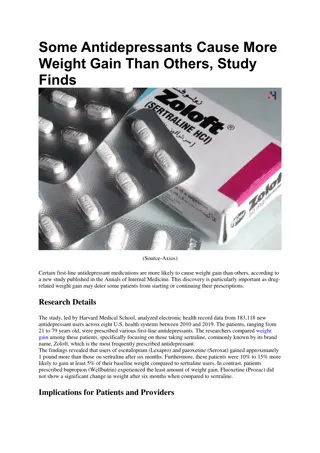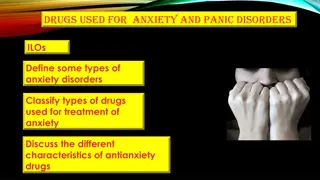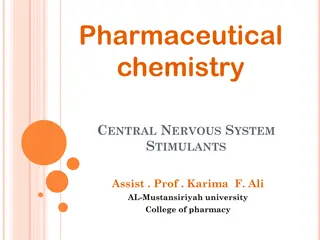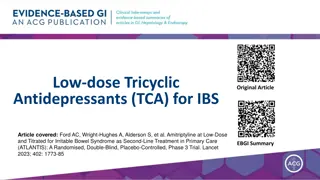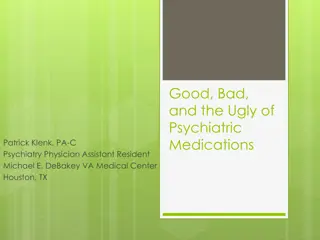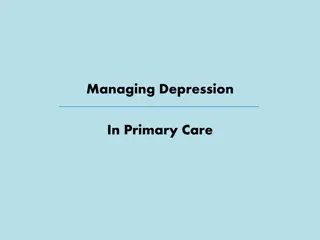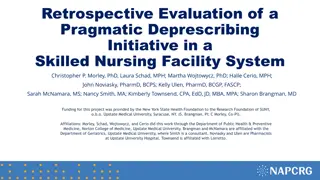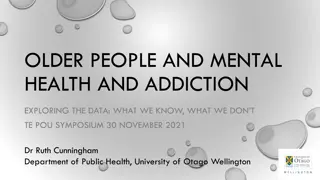Appropriate use of antipsychotics for changed behaviours in people living with dementia
Dementia is characterized by various changes, including behaviours such as wandering, disinhibition, agitation, and aggression. People living with dementia require care that can be approached through non-pharmacological and pharmacological strategies. The overreliance on psychotropic medications lik
0 views • 25 slides
Some Antidepressants Cause More Weight Gain Than Others | healthcare
Certain first-line antidepressant medications are more likely to cause weight gain than others, according to a new study published in the Annals of Internal Medicine
0 views • 2 slides
Overview of Anxiety Disorders and Antianxiety Drugs
Anxiety disorders are conditions characterized by excessive worry and fear that can interfere with daily life. Common types include generalized anxiety disorder, panic disorder, phobias, and OCD. Treatment options include psychotherapy and anxiolytic drugs such as benzodiazepines, 5HT1A agonists, be
0 views • 25 slides
Understanding the Intersection of Cardiology and Psychiatry: Review and Updates
This comprehensive review delves into the correlation between cardiac health and psychiatric medications, focusing on the QT and QTc intervals, antidepressants, antipsychotics, and cardiotoxicity associated with certain medications. It also explores the impact of depression on heart disease, risk fa
1 views • 47 slides
Overview of Central Nervous System Stimulants in Pharmaceutical Chemistry
Central Nervous System Stimulants encompass a diverse group of agents with various effects on the CNS, including analeptics, methylxanthines, central sympathomimetic drugs, and antidepressants. Analeptics are potent CNS stimulants with limited use, while methylxanthines like caffeine have widespread
4 views • 41 slides
Low-Dose Tricyclic Antidepressants (TCA) for IBS: ATLANTIS Study Overview
The ATLANTIS study evaluated the efficacy of low-dose amitriptyline (10-30 mg) in improving Irritable Bowel Syndrome (IBS) symptoms compared to placebo in a 6-month randomized controlled trial in a primary care setting. This important research aims to address the lack of definitive treatment guideli
0 views • 12 slides
Understanding Eating Disorders: Insights and Treatments
Body dissatisfaction is prevalent in both men and women, leading to the development of eating disorders like anorexia nervosa and bulimia nervosa. Anorexia nervosa is characterized by restricted food intake and intense fear of weight gain, while bulimia nervosa involves binge eating and purging beha
0 views • 13 slides
Understanding Antipsychotics and Antidepressants in Veterinary Pharmacology
Antipsychotics and antidepressants play crucial roles in treating psychological and affective disorders in veterinary medicine. Antidepressants are vital in managing abnormal mood and behavior linked to depression, while antipsychotics help address various nervous disorders. The classification of an
0 views • 11 slides
Understanding Psychiatric Medications: The Good, The Bad, and The Ugly
Delve into the complexities of psychiatric medications with a focus on the benefits, risks, and side effects associated with antidepressants, mood stabilizers, antipsychotics, and anxiolytics. Learn about common lab monitoring needs, drug interactions to watch for, and important considerations when
0 views • 36 slides
Comprehensive Guide to Managing Depression in Primary Care
This guide provides essential information on managing depression in primary care, including learning objectives, team members at Open Door Adult Psychiatry, patient criteria, wait times, chart consult services, and insights from the STAR*D Trial. Find out about prescribing antidepressants, when to s
0 views • 18 slides
Retrospective Evaluation of Pragmatic Deprescribing in Skilled Nursing Facilities
This study evaluated the effectiveness of a pragmatic deprescribing protocol in reducing medication classes in two skilled nursing facilities. Findings showed significant reductions in diuretics, opioids, antipsychotics, and antibiotics, with slight overall medication changes. Increases in anticoagu
0 views • 6 slides
Insights on Mental Health and Addiction Among Older Adults: Recent Findings
Exploring the prevalence of mental health and addiction issues among older people through survey data and prescription trends. Dr. Ruth Cunningham from the University of Otago Wellington discussed the lack of up-to-date information and potential worsening trends over time. The presentation also delv
0 views • 20 slides

